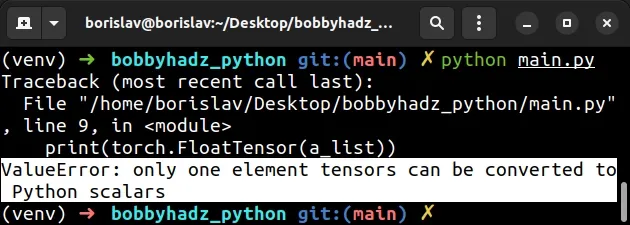Only one element tensors can be converted to Python scalars
Last updated: Apr 11, 2024
Reading time·3 min

# Only one element tensors can be converted to Python scalars
The PyTorch "ValueError: only one element tensors can be converted to Python scalars " occurs when you try to convert tensors that contain multiple elements to Python scalars.
To solve the error, stack the tensors before converting them to Python scalars.

Here is an example of how the error occurs.
import torch a_list = [torch.tensor([3., 4])] * 3 # ⛔️ ValueError: only one element tensors can be converted to Python scalars x = torch.FloatTensor(a_list)
The torch.FloatTensor() class can only convert a list of tensors if they
contain only one element.
For example, the following code sample is valid.
import torch a_list = [torch.tensor(3.)] * 3 # 👇️ [tensor(3.), tensor(3.), tensor(3.)] print(a_list) x = torch.FloatTensor(a_list) print(x) # 👉️ tensor([3., 3., 3.])

Notice that the tensors in the list only contain one element.
This is valid and works as expected.
If your tensors contain multiple elements, use the torch.stack() method.
import torch a_list = [torch.tensor([3., 4])] * 3 # 👇️ [tensor([3., 4.]), tensor([3., 4.]), tensor([3., 4.])] print(a_list) x = torch.stack(a_list) # tensor([[3., 4.], # [3., 4.], # [3., 4.]]) print(x)

The torch.stack() method concatenates a sequence of tensors along a new dimension.
Note that all tensors must be of the same size.
The method returns the output tensor.
If you want to convert the result to a NumPy array, call the numpy() method on
the tensor.
a_list = [torch.tensor([3., 4])] * 3 # [tensor([3., 4.]), tensor([3., 4.]), tensor([3., 4.])] print(a_list) x = torch.stack(a_list).numpy() # tensor([[3., 4.], # [3., 4.], # [3., 4.]]) print(x) print(type(x)) # 👉️ <class 'numpy.ndarray'>

The
tensor.numpy()
method returns the tensor as a NumPy ndarray.
# Use the size() method if you need to get the sizes of a list of tensors
If you need to get the sizes of a list of tensors:
- Use a list comprehension to iterate over the list.
- Use the tensor.size() method to get the size of each tensor.
import torch a_list = [torch.tensor([3., 4])] * 3 sizes = [t.size() for t in a_list] # 👇️ [torch.Size([2]), torch.Size([2]), torch.Size([2])] print(sizes)

We used a list comprehension to iterate over the list of tensors.
On each iteration, we call the size() method on the tensor.
The tensor.size() method returns the size of the tensor.
There is also a shape attribute that returns the size of the tensor.
import torch a_list = [torch.tensor([3., 4])] * 3 sizes = [t.shape for t in a_list] # 👇️ [torch.Size([2]), torch.Size([2]), torch.Size([2])] print(sizes)
The code sample achieves the same result using the tensor.shape attribute.
# Use the numpy() method to convert a list of tensors to a list of NumPy arrays
If you need to convert a list of tensors to a list of NumPy arrays, call the
numpy() method on each tensor.
import torch a_list = [torch.tensor([3., 4])] * 3 a_list = [torch.tensor([3., 4])] * 3 arrays = [t.numpy() for t in a_list] # 👇️ [array([3., 4.], dtype=float32), # array([3., 4.], dtype=float32), # array([3., 4.], dtype=float32)] print(arrays)

Note that it is more performant to use the size() method if you only need to
get the size of each tensor.
Converting each tensor to a NumPy array is not as performant.
# Additional Resources
You can learn more about the related topics by checking out the following tutorials:
- Convert a NumPy array to 0 or 1 based on threshold in Python
- How to get the length of a 2D Array in Python
- TypeError: 'numpy.ndarray' object is not callable in Python
- TypeError: Object of type ndarray is not JSON serializable
- IndexError: too many indices for array in Python [Solved]
- How to replace None with NaN in Pandas DataFrame
- FutureWarning: pandas.Int64Index is deprecated and will be removed from pandas in a future version
- You are trying to merge on int64 and object columns [Fixed]
- Python: Can't call numpy() on Tensor that requires grad

